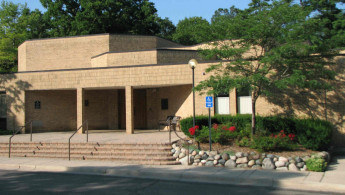Michigan synagogue member sues weekly anti-Israel protesters over 'anti-semitism'
A member of a United States synagogue is suing anti-Israel protesters and city leaders over 16 years of protests outside the congregation, arguing the protesters have been uniquely provocative and that some restrictions on them would not violate free-speech protections in the US Constitution.
The regular Saturday protests in front of Beth Israel congregation in Michigan draw up to a dozen people every week since 2003, with signs the lawsuit describes as hateful and anti-Semitic.
According to the 85-page filing in US District Court for Eastern Michigan, the signs amount to harassment of worshipers, so don't qualify for full First Amendment protections.
"The First Amendment right of free speech does not entitle a speaker to use that right repeatedly to bludgeon, for weeks and years at a time, in the same location," the lawsuit said.
"The First Amendment ... is subject to appropriate limitations on its continued and repeated usage."
The lawsuit filed on behalf of Marvin Gerber, a member of the Beth Israel Congregation, contends the protests violate Ann Arbor ordinances on such public gatherings.
It seeks an order putting restrictions on the demonstrations and demands an end to what it calls "harassing conduct." It also seeks unspecified damages for emotional distress.
Those named as defendants include protester Henry Herskovitz and his two organizations, Jewish Witnesses for Peace and Friends and Deir Yassin Remembered, which say they were founded to advocate for Palestinians.
|
Ann Arbor Mayor Christopher Taylor is also among the defendants.
MLive reported Tuesday that Taylor and other city officials have sharply criticised the protesters over the years and want the demonstrations to stop. But they've also said they are powerless to intervene because of First Amendment protections.
"The city has worked with synagogue leadership and congregants for years on this issue," Taylor said. "I recognize the pain caused by the protesters and it's disgusting. We believe we've acted in accordance with our legal obligations."
Taylor said Tuesday he hadn't yet seen the lawsuit.
The lawsuit, filed last week, describes many of the protesters' messages as anti-Semitic, citing signs that sometimes read "Resist Jewish Power" and "Jewish Power Corrupts".
A call to a telephone number listed for Herskovitz went unanswered, and there was no response to an email for his organizations seeking comment.
Herskovitz has previously denied accusations of anti-Semitism. MLive cited previous interviews in which he said a synagogue whose name contains the word "Israel" was an appropriate venue to protest Israeli policies.
The lawsuit said the fact the demonstrators only target the Beth Israel Congregation, and that the protesters provide members of the congregation no opportunity to avoid them, opens them up to restrictions.
Read more: Accusing Bernie Sanders of anti-Semitism is nothing but thinly veiled Islamophobia
"The conduct of the protesters is having an adverse emotional effect on Jewish children and young adults who, approaching the synagogue, see the signs ... insulting their religion and and denouncing their loyalty to Israel," the lawsuit said.
The lawsuit will likely faces major hurdles. Federal courts have typically extended First Amendment protections widely, including to the most provocative and offensive speech. It's among the legal issues where there is significant consensus among judges with otherwise contrasting interpretations of the Constitution.
The pro-Palestinian Boycott, Divestment Sanctions (BDS) movement has been increasingly curtailed despite First Amendment protections.
US President Donald Trump signed an executive order Wednesday to include "Jewishness" in Title 6 of the Civil Rights Acts, a move that sees universities lose their federal funding if they fail to combat anti-semitism.
The Foundation for Individual Rights in Education released a statement Tuesday warning the executive order infringes on the right to free speech.
Read more: Trump signs order defining Judaism as a nationality, not just a religion
"The apparent rise in campus anti-Semitism is a real problem. But however well-intentioned, if the President's Executive Order does in fact rely on [the IHRA] definition, it will impermissibly threaten the expressive rights of students and faculty at institutions across the country," the organisation warned.
BDS, which advocates peaceful resistance, aims to pressure Israel to adhere to international law and human rights by lobbying various states, institutions and personas to understand its oppression of Palestinians and take action as a result.
Israel claims the movement is a strategic threat and accuses it of anti-Semitism – a claim activists firmly deny, calling it an attempt to discredit them.
Follow us on Twitter and Instagram to stay connected





 Follow the Middle East's top stories in English at The New Arab on Google News
Follow the Middle East's top stories in English at The New Arab on Google News
![Israeli forces ordered bombed Gaza's Jabalia, ordering residents to leave [Getty]](/sites/default/files/styles/image_330x185/public/2176418030.jpeg?h=a5f2f23a&itok=_YGZaP1z)

